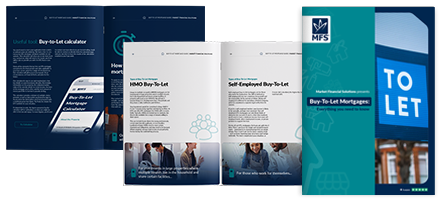Disclaimer
Market Financial Solutions are a bridging loan and buy-to-let mortgage provider, not financial advisors. Therefore, Investors are encouraged to seek professional advice. The information in this content is correct at time of writing.

We are currently in a time of high inflation and rising interest rates. Many investors and landlords will be looking for ways to reduce their monthly outgoings, while continuing to invest in the UK property market. A deferred interest mortgage is one option of doing this. However, many borrowers may be unfamiliar with the intricacies of deferred interest. So, it’s important that they are aware of everything involved with a deferred interest loan before committing to a deal. With this in mind, this blog will answer the question, how a deferred interest mortgage works, to provide some clarity.
What is deferred interest on a mortgage loan?
Firstly, lets define what ‘deferred interest’ means.
Deferred interest on a mortgage loan is an arrangement that a borrower has with a lender. It allows them to borrow money and delay the interest owed for a certain amount of time. The way we do this at Market Financial Solutions, is that we retain the deferred interest and it is deducted from the gross loan amount to ensure that the LTV does not become too high.
How does a deferred interest mortgage work?
Typically, deferred interest is a popular arrangement among consumers who buy expensive items – such as cars or pieces of furniture. Many retailers will waive the interest charges if the borrower completes payment for the item within the interest-free deferral period.
Other facilities also offer deferred interest. However, interest typically continues to accrue throughout the deferral period. At the end of the loan or mortgage term, the interest not paid by the borrower during the deferral period is added onto the principal amount of the loan.
Some mortgage lenders will include a definitive date when a borrower must make a lump-sum payment to recoup their interest charges.
Although, few lenders may provide fixed-rate loans that rise by a certain amount each year instead.
This can be particularly useful for borrowers who are expecting their income to grow fast enough to keep pace with the increasing payments, and who could not afford the loan otherwise.

Benefits & challenges
The main advantage of a deferred interest mortgage is that it can free up cash flow during the deferral period. This allows borrowers to allocate funds to other financial obligations that may need to take priority.
For instance, the borrower might face an unexpected financial shock. Being able to defer interest payments means that they will have to make less substantial monthly repayments. This can lower monthly outgoings and provide more breathing room in a borrower’s budget. Or a BTL landlord could make improvements to a newly acquired property to make it more attractive to tenants and potentially increase monthly revenue. Furthermore, Interest Coverage ratio (ICR) calculations are typically used to calculate how much a client can borrow in relation to the monthly rent earned. On a deferred interest mortgage the client can borrow more. To see an example of this, you can use our BTL loan calculator.
However, with other lenders a deferred interest mortgage may be higher risk than traditional options, because the owed amount increases. As interest accrues throughout the term, this can result in ‘negative amortisation’. It can increase the amount of interest that a borrower will have to pay, because they effectively have to pay interest on interest.
As such, the owed amount continues to grow throughout the deferral period. Consequently, the time it takes the borrower to pay the loan off tends to increase. This means, in the short-term, borrowers pay lower payments. But they will generally pay more in total costs across the loan term than they might have done otherwise. This is not how Market Financial Solutions works however. So it’s important for investors to understand how their individual lender deals with deferred interest.
When to use a deferred interest mortgage
Borrowers should only use deferred interest on a mortgage if the terms align with their financial objectives. Indeed, while a deferred interest mortgage can be useful in the short-term, it is vital to be aware of the longer-term implications.
That said, borrowers might consider using deferred interest if they are anticipating financial difficulties. This could include a job loss or income reduction. But they know that their situation will improve again in due course. By using deferred interest during the initial years of a mortgage, borrowers can give themselves breathing room by delaying repayments. When repayments increase at the end of the deferral period, they’ll hopefully be better placed to manage them.
Similarly, investors and landlords may have other financial obligations or expenses they may need to prioritise. As such, reducing interest payments can help them balance their books in the short-term.
Are there extra charges?
Whether deferred interest mortgages have extra charges on them depends on the terms of the loan agreement. But there are some typical charges that borrowers might encounter. Some lenders may charge borrowers for the administrative fees or processing charges. Some may charge early repayment fees if the borrower pays off the loan early or makes additional payments during the deferral period. Generally, these charges make up for any interest that the lender might lose by reducing the principal amount ahead of schedule.
Will deferred interest impact a credit score?
Deferred interest itself does not directly impact a borrower’s credit rating. As with most financial arrangements however, how a borrower handles their repayments could have an effect on their credit rating.
A borrower making their payments on time, including during the deferral period, is likely to maintain a better credit score than someone regularly missing or making late payments.
Elsewhere, because a deferred interest mortgage can result in a higher loan balance, borrowers might see their credit utilisation increase. This can push down their credit score. Similarly, taking on higher levels of debt from a higher loan balance can also impact their creditworthiness.
Finally, prepayment penalties can harm a borrower’s credit score. It technically means that the borrower has deviated from the original terms of a loan.
Is a deferred interest mortgage worth it?
Knowing how deferred interest works is the first step. If a borrower has immediate financial needs or faces temporary cash flow constraints, deferred interest can provide short-term relief. By delaying interest payments, funds can be freed up for other expenses or investments. In this situation, a deferring interest mortgage can be very useful.
However, borrowers might face difficulties in meeting the high repayments in the long-term. Particularly if their financial situation doesn’t improve by as much as they had hoped it would.
As such, it’s vital that borrowers consider their financial stability and ability to manage a deferred interest mortgage effectively. Especially because there may be alternative forms of finance that suit them better.
Ultimately, whether a deferred interest mortgage is worth it depends on a careful evaluation of a borrower’s specific circumstances and goals. Therefore, it’s advisable to carefully review the loan terms and potential risks. The borrower should seek advice from a broker or experienced lender if needed, and consider the long-term implications before deciding.
At Market Financial Solutions, we handle all deals on a case-by-case basis and adapt to fit the needs of the client. To see how our flexibility works in practice, please have a read through our case studies. Also, check out our full list of deferred interest mortgages to see how we can help you with your specific plans.
The Complete Guide to
Buy-to-Let Mortgages
Everything you need to know
- Fundamentals
- Different mortgage types
- Useful tools
- Industry stats & more





